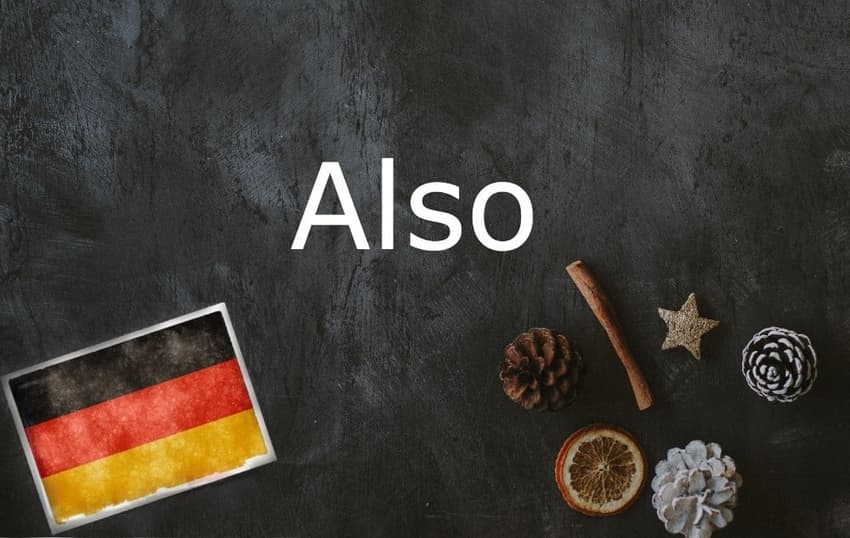German word of the day: Also

'Also' may be commonly used in both German and English, but has completely different uses in both languages. These are the various ways in which you'll hear it everyday.
Why do I need to know it?
Also is one of the most common German words, whether you’re trying to start a conversation or transition from one to another topic. It’s also a practical particle for when you’re trying to fill in a sentence.
It's not only helpful when conversing with native speakers, but also part of the vocabulary list for a B1 German certificate at the Goethe Institute.
What does it mean?
This tiny four-letter word (pronounced like alzo) is often just used as the German equivalent of “so” or “therefore” - a way to state why something is occurring. A similar use is aus diesem Grund, or "for this reason".
It’s also a way of spelling out what something means or to give an example, similar to the German das heißt.
Also is sometimes also used as a filler word, meaning you might hear a person start a sentence with also before they further continue with their train of thought. Sometimes it will sound like a drawn-out alsooo if they’re still contemplating what they want to say.
READ ALSO: Das ist ja mal wichtig: The complete guide to German particles
A more colloquial use is na also! when you feel validated in a point you were trying to make, similar to siehst du! or the extra informal sieste! You can also use it to emphasise another word, for example also schön! (How nice!) upon receiving good news.
The word stems from the Middle High German Aus all und so.
More examples of how it’s used:
Er ist krank, also bleibt er zuhause heute.
He is sick, so he’s staying home today.
Öffentliche Verkehrsmittel, also Busse, Straßenbahnen und U-Bahnen, sind heutzutage in modernen Großstädten nicht mehr wegzudenken.
Public transport, meaning busses, trams and the metro, is nowadays an essential part of modern cities.
Also, das weiss ich noch nicht, aber ich versuche, herauszufinden.
Well, I don’t know that yet, but I’m trying to find out.
Don't miss any of our German words and expressions of the day by downloading our new app (available on Apple and Android) and then selecting the German Word of the Day in your Notification options via the User button.
Comments
See Also
Why do I need to know it?
Also is one of the most common German words, whether you’re trying to start a conversation or transition from one to another topic. It’s also a practical particle for when you’re trying to fill in a sentence.
It's not only helpful when conversing with native speakers, but also part of the vocabulary list for a B1 German certificate at the Goethe Institute.
What does it mean?
This tiny four-letter word (pronounced like alzo) is often just used as the German equivalent of “so” or “therefore” - a way to state why something is occurring. A similar use is aus diesem Grund, or "for this reason".
It’s also a way of spelling out what something means or to give an example, similar to the German das heißt.
Also is sometimes also used as a filler word, meaning you might hear a person start a sentence with also before they further continue with their train of thought. Sometimes it will sound like a drawn-out alsooo if they’re still contemplating what they want to say.
READ ALSO: Das ist ja mal wichtig: The complete guide to German particles
A more colloquial use is na also! when you feel validated in a point you were trying to make, similar to siehst du! or the extra informal sieste! You can also use it to emphasise another word, for example also schön! (How nice!) upon receiving good news.
The word stems from the Middle High German Aus all und so.
More examples of how it’s used:
Er ist krank, also bleibt er zuhause heute.
He is sick, so he’s staying home today.
Öffentliche Verkehrsmittel, also Busse, Straßenbahnen und U-Bahnen, sind heutzutage in modernen Großstädten nicht mehr wegzudenken.
Public transport, meaning busses, trams and the metro, is nowadays an essential part of modern cities.
Also, das weiss ich noch nicht, aber ich versuche, herauszufinden.
Well, I don’t know that yet, but I’m trying to find out.
Don't miss any of our German words and expressions of the day by downloading our new app (available on Apple and Android) and then selecting the German Word of the Day in your Notification options via the User button.
Join the conversation in our comments section below. Share your own views and experience and if you have a question or suggestion for our journalists then email us at [email protected].
Please keep comments civil, constructive and on topic – and make sure to read our terms of use before getting involved.
Please log in here to leave a comment.